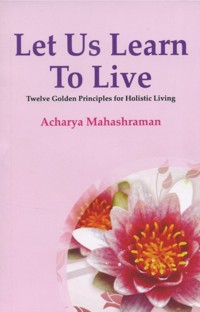For the swan, the lotuses and pearls represented the height of existence, whereas for the herons, only the fish were important.
Humans are the highest form of life in the universe. We have five sense organs: the eyes, the nose, the ears, the tongue and the skin. In addition, we have a mind and intellect. All the sense organs are vital, but the eyes are the most important because they are used more than the others.
Possessing the ability to see is one thing, using it is quite another. There is no reason to ponder the use or misuse of eyes for those who do not have them. But for those who do ask, do they deserve the gift of sight? Those who visit monks, read high quality literature and religious books, choose to see spiritually-uplifting sights and practice Animesh Preksha - that is, fixing the eyes on an object for a given duration of time - are making worthy use of their eyes. Looking with evil intention, enjoying indecent scenes, and reading unhealthy or vulgar literature constitute abuse of the eyes. Eyesight is extremely valuable. Those who possess vision may or may not value it, but for those who cannot see, sight is beyond value. The world is perceived as small, dark and colorless for the blind.
The immense value of eyesight is exemplified by this historic incident:
Some people came to Mahatma Buddha and said, "Lord! A man in our village doesn't accept the existence of the sun. We tried to teach about the sun, light, and dawn, but he refuses to acknowledge they exist!" Mahatma Buddha asked, "Does he have vision?" They replied, "Lord! He has no eyesight. He is totally blind." Mahatma Buddha said, Then how can you expect him to believe? Take him to a doctor. When his blindness is cured, then only will he see the world with light. After that his views will also change."
Leave aside those without sight, even people with perfect eyesight often see the world through glasses tinted by their own biases. They are unable to visualize reality in an objective manner. To a jaundiced eye everything looks yellow. To see and perceive reality as it is rather than what we would like it to be, one needs to release one's prejudices.
The Value of Vision
Perspective plays an important role in every action. For example, a cat grabs a kitten as well as a mouse. The reasoning, however, for these acts is entirely different and so is the grip! The baby - the kitten - is loved and protected whereas the mouse is hunted and eaten. The difference is in the intention behind the action. How a person acts upon a situation is dictated by the intent with which the person views it. A surgeon cuts into the stomach of a person with a knife. A murderer might do the same. Though similar actions, the objectives behind them are different. The doctor's aim is to save a life and the murderer's is to end it. Change in intention changes the action.
The Value of Human Life
Human life is precious. Can a primarily materialistic man assess its value?
A king went to an ascetic. Greeting him arrogantly he said, "Mahatma! Do you know who I am? I am an emperor. My empire is vast and prosperous. I have a huge army and an enormous treasury."
The Mahatma ignored the king's arrogance, and listened to him patiently and without reacting. When the king paused he said, "O King! I am aware of your prosperity and position. But from my point of view it is not worth more than two glasses of water."
The astonished king asked, "How can my great empire be worth only two glasses of water?"
The Mahatma replied, "Imagine you have lost your way in a dense jungle. You are all alone. It is summer. You are extremely thirsty, but there is no water in sight. You become aware that you may soon die of thirst. Suddenly someone appears and offers you a glass of water. What would you give for it?"
The king immediately replied, "What less could I give my savior than half of my empire?""Well, now imagine again. You went riding on a scorching hot day. Your newly trained horse led you into a thick forest, away from all your ministers and guards. You badly wanted to urinate but you couldn't, and this resulted in excruciating pain. Suddenly a doctor arrived and gave you some medicine, enabling you to pass a glass of urine and relieving your discomfort. You felt good. Now tell me, what would you give the doctor for helping you?"
The king answered, "I would reward him with half of my kingdom."
The Mahatma said, "O, King! Now do you understand? You would give half of your empire for a glass of water and the other half for getting it out. So your kingdom, by your own assessment, is valued at two glasses of water. So why are you so proud and egotistical?" Realizing his distorted vision, the king fell down at the Mahatma's feet and resolved to embrace humility.
False pride and the inability to face reality lead to misconception. An egotistical person shuns reality. He might exhibit his pride among others, but his pride cannot overcome his own fear of death.
Why should a man become egotistical? After all, he has attained human life only recently. According to Jainism, in previous births he may have been a seed in a berry or some other form of vegetation, or a poisonous snake or a scorpion or any other lower form of life.
When this reality, this truth, is understood, false pride will dissipate. Only by comprehending the nature of things in its real form can right knowledge be attained.
One needs to amend one's perspective by understanding the importance of being human and striving for perfection through contemplation. Only a human being has the capacity to become a Supreme Being. Soul has the power to turn into a supreme soul. Neither animals nor birds nor even angels can achieve this ultimate state in their present forms. Humans alone can develop such qualities and end the cycle of birth and death. That is why this human life is so significant. Humans can think, discriminate and follow ethical rules. Only a sense of morality differentiates humans from animals.
A saint named Bhartarihari once said:
"Ahar-nidra-bhaya-maithunam cha,
Samanyametad pashubhir naranam.
Dharmo hi tesham adhiko visbesho,
dharmena hinah pashubhih samanah.""Food, sleep, fear, and sex are common to animals as well as human beings. Only morality and discerning power differentiates man from animal."
As Is the View So Is the World
Once a swan living in a sacred lake flew out and reached a pond where there were many herons. Seeing a strange bird in their midst, the herons became curious and asked the swan many questions, as in this beautiful hymn of their dialogue composed by a poet in Sanskrit:
"Kastvam lohita-lochanasya charano hansak kuto manasat,
Kin tatrasti suvarna-pankajavanany ambhah sudha-sannibham.
Muktashuktir athasti shankhanivaha vaidurya-rohah kvachit,
Shambukah kimu santi neti cha bakair akarnya hih hih kritam."The herons asked, "Friend! Who are you? You are red-faced, red-legged, and even red-eyed. What is your sweet name?" The swan replied, "I am a species of swan, known as flamingo."
"Where do you come from?;
"From a sacred lake called Manasarovar, situated below Mt. Kailash in the Himalayas."The name 'Manasarovar' [sacred lake] was new to the herons. They asked, "What is there in Manasarovar?"
The swan replied, "It is beaming with golden lotuses. Its water is as sweet as nectar. Countless pearls, shells, conches, lapis lazuli, and jewels adorn its waters."
"Tell us! Does it have fish?"
"No, there are no fish at all."
The herons, expressing their dismay, said, "Then, your Manasarovar is useless. What value does it have if there are no fish in it?"
From the herons' perspective, fish were everything - the only thing they valued. The pearls, shells, conches, etc. were of no use to them. And what meaning could there be in golden lotuses?
The essence of this story is the differing perspectives of swan and herons. For the swan, the lotuses and pearls represented the height of existence, whereas for the herons, only the fish were important. Man is what his perception is, and his perception formulates his opinion and ultimately, his intention. If man's intention is like that of the herons, he will not seek anything beyond fish. How then can he evaluate the pearls and conches of his life?
 Acharya Mahashraman
Acharya Mahashraman

